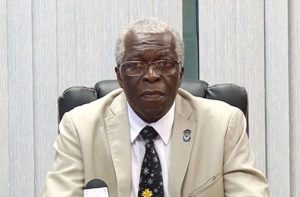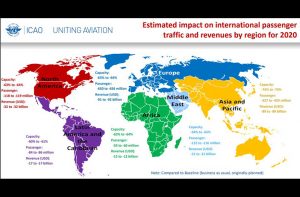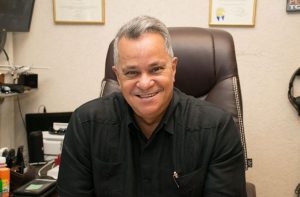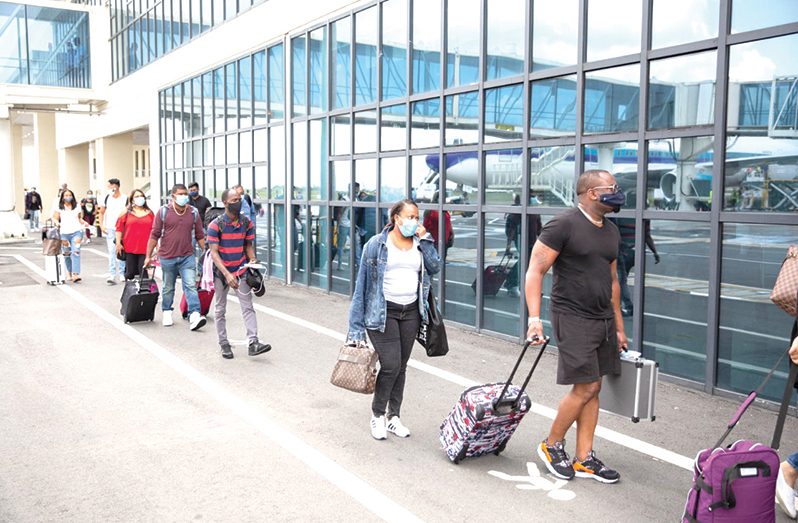— aviation industry, down by 89 per cent in September, making gradual recovery, says Field
— industry catalysing increase in economic activities
By Navendra Seoraj

THE local aviation industry, after declining significantly over the past nine months because of the novel coronavirus (COVID-19) pandemic, is on the road to recovery, with over 5,000 persons arriving in Guyana since the country opened its international airports on October 5, 2020.
Guyana’s two international airports, the Cheddi Jagan International Airport and Eugene F. Correia International Airport, were closed to incoming commercial international flights on March 18, 2020, after Guyana recorded its first COVID-19 case on March 11.
The airports were initially scheduled to close for a two-week period, however, as cases in the country increased, the closure continued to be extended. But the new Government, after an analysis of the situation, thought it best to reopen the airports under strict conditions aimed at reducing the possibility of Guyana recording imported cases of COVID-19.
To date, there has been no report of any imported case of this disease since the reopening of the airports. And, with management of the situation appearing to be ‘seamless’, stakeholders are anticipating an increase in arrivals, and continuous recovery of the aviation industry, and, by extension, the entire economy.
Studies show that the most direct activities associated with aviation create G$20.7 billion in annual economic activity. This represents 3.2 per cent of Guyana’s total gross domestic product (GDP).
Moreover, nearly 12,000 Guyanese jobs are supported by the aviation industry, the majority in either transportation or tourism. This accounts for nearly one in twenty jobs in Guyana. Air passengers also generate roughly G$1.7 billion in travel tax revenue for the government
Achieving those prospects this year might, however, be out of reach for the industry, even though recovery has started.
This is mainly because the impact of the COVID-19 pandemic on the industry, according to Director-General of the Guyana Civil Aviation Authority (GCAA), Lt. Col. (Ret’d) Egbert Field, has been “devastating”.
“The aviation industry shrunk by over 80 per cent within the past few months, and that is not only due to flights coming into and landing in Guyana, but because the over-flights were tremendously reduced as well.
“The impact on the aviation industry, both locally and globally, was devastating, because you could not travel due to closure of airports. And apart from that, a number of states were locked down; nobody moved into that state or out; the state was locked down. For instance, there was lockdown in London, Paris and so on; practically no movement between countries. And that is what aviation is all about; moving from one state to another,” said Field during an interview with the Guyana Chronicle on Tuesday.
NO MOVEMENT, NO AVIATION BUSINESS

The aviation expert explained that when a country is locked down, as was the case in many of them over the past nine months, there is no aviation movement, and no aviation business. As a result, many airlines filed bankruptcy, retrenched staff, and even had to “shut shop” completely.
A study done by the International Civil Aviation Organisation (ICAO) titled, “Effects of Novel Coronavirus on Civil Aviation: Economic Impact Analysis”, has revealed that there was an overall reduction of air passengers, both internally and domestically, by 59 to 60 per cent when compared to 2019.
The ICAO’s study, which was released on November 4, 2020, also showed that airports worldwide recorded an estimated loss of approximately 60 per cent of passenger traffic, and 61 per cent of over US$104.5 billion in revenue in 2020, when compared to business as usual. Airlines also recorded a 54.7 per cent decline of revenue in 2020, when compared to 2019.
While not referring to the report, Field, in speaking more about the impact of COVID-19 on the aviation sector, said: “If you have to maintain equipment, it reaches to the point where what you have in your reserve is spent out by maintaining equipment, or keeping the basic staff… Eventually, you will run out of funds; you will close business. And that is what happened all around the world; not only Guyana.”
In September, prior to the reopening of the airports, aviation in Guyana was down by 89 per cent; which was a slight recovery from the 92 per cent decline in May. This ‘slight recovery’ was due mainly to domestic travel, which continued throughout the past nine months, but under ‘strict’ guidelines.
But with the international airports now open to commercial and international travel, Field said the situation will undoubtedly improve, but the pace of recovery will be slow, because economic recovery is being balanced with the protection of people.
“We want to make the air safe for passage of passengers, but we have already started to see a slight recovery; most of the persons who have arrived in Guyana so far are coming from North America,” said Field.
CATALYSING GROWTH

The incremental recovery of the aviation industry has had a ripple effect across various sectors in Guyana, and is now being viewed as a catalyst for the rejuvenation of the local economy.
“The aviation sector is playing a tremendous role in the recovery of the economy, by facilitating the movement of passengers; the Government has put measures or protocols in place at the airports to monitor and overlook the reopening of the airport. And the airlines, having noticed this, have begun moving; so you can see the massive contribution aviation is making towards the rebuilding of this economy,” said Field.
Airlines flying to Guyana include American Airlines, Eastern Airlines, Caribbean Airlines and Copa Airlines. Trans Guyana Airways, a local airline, has also been flying to and from Barbados.
“A lot of people are coming in, so the stakeholders are extremely happy with the move by the administration to open the airports; they are thankful because they have been able to not only retain their workers, but to reinvest in their businesses,” said Field.
In cases where local projects were awaiting the arrival of experts or investors, there has been movement, as businessmen/women have started to travel in and out of Guyana.
Chairman of the Private Sector Commission (PSC), Nicholas Boyer told the Guyana Chronicle that investors have already arrived in Guyana to follow up on projects that they had started before the pandemic became an issue locally.
“Those investors are using the opportunity to come back and do market research and development,” said Boyer.
The commercial retailers and wholesalers are also expected to benefit from the influx of passengers, who will be here for the Christmas season, which is fast approaching.
With an anticipated increase in arrivals, Field is confident that businesses can prepare for the Christmas season, by hiring adequate staff, and investing where necessary, as the movement of passengers naturally increases the flow of money in an economy.
“People have begun to come in and spend; things were stagnant, but with the movement of passengers, more hotels will have persons; stores will get sales, and the economy will pick up,” said Director-General Field.
Owner of the Roraima Group of Companies, Gerry Gouveia is also optimistic about the recovery of Guyana’s economy. His view is that COVID-19 is becoming one of the dangers of living, so persons will have to be careful and adhere to safety measures while conducting their business.
Speaking specifically about the tourism sector, he said hotels and tour operators who comply with the COVID-19 measures will most likely have an opportunity to operate and generate revenue. The Guyana Tourism Authority (GTA) had reported that the sector lost an estimated 46 per cent of its total revenue over a six-month period.
With the tourism sector being one of the hardest-hit by COVID-19, the President, Dr. Irfaan Ali, has assured the tourism industry players that his Government is committed to supporting all stakeholders through the very critical recovery process.
“The Guyana Tourism Authority continues with their marketing efforts to promote nature adventure and eco-tourism, both locally and internationally, and, with the support of the private sector, we have no doubt that this will allow the sector to rebound with strengthened resolve and greater results,” the President said recently.












